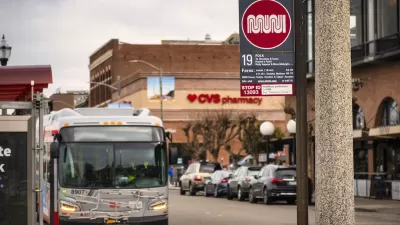Leap, one of three luxury commute services competing with public transit in San Francisco's Marina District, has run afoul with the state regulatory system and was forced to shut down until it obtains an operating license.
San Francisco commuters happy to pay up to $6.00 for a stress-free, amenity-filled commute from the Marina District to the Financial District or South of Market Area (SoMA) could be back to spending $2.25 to join the masses aboard crowded Muni buses.
In late March, we wrote about two new San Francisco startup transportation companies, Leap and Chariot, that unlike pricier rideshare, offered rides aboard buses and vans, respectively, for anyone willing to pay up to $6.00 for a much less stressful, if not pleasurable, commute. Kristen V. Brown for the San Francisco Chronicle provides an update on one of these high-end, public transit alternatives.
Leap announced on Tuesday [May 19] that it has temporarily suspended service after the California Public Utilities Commission [CPUC] served the company with a cease-and-desist order on May 11.
Earlier, "the CPUC said that Leap technically falls under city regulation pending the approval of its state permit," writes Brown. "Now, it seems, the CPUC has decided authority of Leap falls to the state even before its license is finalized."
San Francisco County Board of Supervisor Mark Farrell, who represents the Marina District, indicated he will hold public hearings on these types of transit services during a March call-in public radio show, KQED Forum. When asked about the regulatory issue, he answers that the San Francisco Metropolitan Transportation Authority (SFMTA) is the city's regulatory body in the matter, as well as the state PUC.
According to his April 28 press release, he will "(c)all on the SFMTA and [San Francisco County Transportation Authority] SFCTA to Develop Report and Recommendations for Regulating Private Commuter Shuttle Services."
At the March 24th meeting of the Board of Supervisors, Supervisor Mark Farrell publicly requested a hearing to discuss the city’s policy approach toward these new private commuter shuttles. He intends to host that hearing at the conclusion of this white-paper, which is expected in the next six-months.
In addition to the regulatory issues that forced its shutdown, the elite public transit services ran into problems with accessibility to the disabled and failure "to comply with safety regulations including mandated California Highway Patrol bus inspections and a Department of Motor Vehicles program monitoring driver safety," writes Brown.
Notwithstanding the legal issue and the "two-tiered" criticism that surfaced during in KQED's Forum, there does appear to be a niche for these types of private, public transit operators.
With its $2.5 million in venture capital, Leap is among a growing class of private shuttles in San Francisco that also includes Chariot and Loup. The idea is to cater to commuters who are willing to pay a premium to avoid the unpleasantries of public transit. Leap rides cost $6 and an app controls every aspect of the experience — from displaying schedules to ordering $7 cold-pressed juice on-board.
While Leap obtains its operating license from the CPUC, Leap's loss will be Muni's, Chariot's, or Loup's gain. But which service will they choose?
FULL STORY: Leap Transit shut down by the state for operating illegally

Alabama: Trump Terminates Settlements for Black Communities Harmed By Raw Sewage
Trump deemed the landmark civil rights agreement “illegal DEI and environmental justice policy.”

Planetizen Federal Action Tracker
A weekly monitor of how Trump’s orders and actions are impacting planners and planning in America.

The 120 Year Old Tiny Home Villages That Sheltered San Francisco’s Earthquake Refugees
More than a century ago, San Francisco mobilized to house thousands of residents displaced by the 1906 earthquake. Could their strategy offer a model for the present?

Opinion: California’s SB 79 Would Improve Housing Affordability and Transit Access
A proposed bill would legalize transit-oriented development statewide.

Record Temperatures Prompt Push for Environmental Justice Bills
Nevada legislators are proposing laws that would mandate heat mitigation measures to protect residents from the impacts of extreme heat.

Downtown Pittsburgh Set to Gain 1,300 New Housing Units
Pittsburgh’s office buildings, many of which date back to the early 20th century, are prime candidates for conversion to housing.
Urban Design for Planners 1: Software Tools
This six-course series explores essential urban design concepts using open source software and equips planners with the tools they need to participate fully in the urban design process.
Planning for Universal Design
Learn the tools for implementing Universal Design in planning regulations.
Clanton & Associates, Inc.
Jessamine County Fiscal Court
Institute for Housing and Urban Development Studies (IHS)
City of Grandview
Harvard GSD Executive Education
Toledo-Lucas County Plan Commissions
Salt Lake City
NYU Wagner Graduate School of Public Service




























